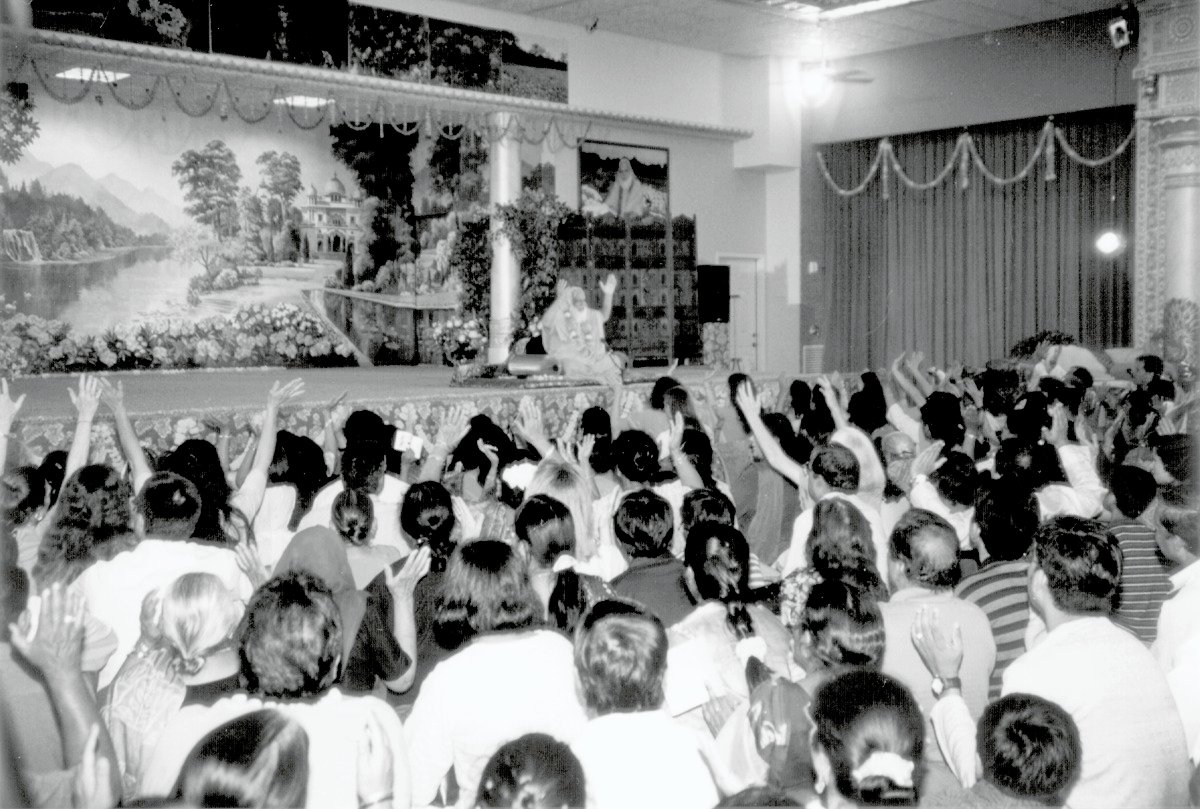A Rasik Saint graciously accepts the services of his devotees as tokens of their affection. Such offerings automatically attract the grace of the Master and help to form a relational bond for the benefit of the devotee.
Swami Prakashanand Saraswati, also known as Shree Swamiji, was born into a respected Brahmin family in Ayodhya in 1929. Drawn only to the love of Radha Krishn, he humbly and respectfully declined when offered the position of Jagadguru Shankaracharya of Jyotirmath in 1952. He instead traveled to the isolated areas of Braj, where he spent 20 years devoting himself to the loving worship of Radha Rani and Krishn. In 1972, inspired by Shree Radha, he began teaching the path of raganuga bhakti (divine love consciousness). He founded the International Society of Divine Love in the USA and similar organizations in India.
Other article you might like: The Consequences of Karmas by Swami Prakashanand Saraswati
Swami Prakashanand authored 11 books on practical aspects of God’s realization. His major undertaking, “The True History and the Religion of India,” is a monumental, comprehensive encyclopedia encompassing various aspects of Sanatan Dharma that presents logical, scriptural, scientific, philosophical, and historical evidence.
In his column, “How Does a Saint Impart His Grace?”, H.D. Swami Prakashanand Saraswati reveals some of the ways that a Saint blesses people.
He writes that a saint is a living manifestation of Divine Bliss and Grace, reflective of the form of God they have attained. Thus, receiving a saint’s blessings isn’t merely a customary gesture but a profound spiritual gift bestowed in relation to a disciple’s devotion. Swamiji says that it’s crucial to understand that a true saint’s grace is necessary to foster spiritual growth for devotees. This profound Grace emanates from the Saint’s heart, and individuals receive deeper devotional experiences of their Guru’s Grace by purifying their hearts to receive it.
Quoting the Bhagwatam, Prakashanand Saraswati describes the Divine expressions of bhao, or ecstatic love, witnessed in a Saint. Whether discussing Radha or Krishn, chanting their names, or recounting their virtues and leelas, the Saint can display a range of emotions. “Tears may flow, smiles may grace their face, laughter may echo, and feelings of separation or closeness may arise,” writes Prakashanand Saraswati.
He mentions, “At times, they remain still, while other moments find them in a state of trance or dancing ecstatically. Through their presence, the Saint sanctifies their surroundings and uplifts souls, bringing divine grace to all who encounter them.”
A Saint bestows blessings upon souls in myriad ways. They are:
- Through Presence: It’s widely accepted that everything emits energy. A human being emits bodily radiation, brain waves, and mental qualities (sattva, raj, tam, or devotional). A Saint emanates Divine radiation from their entire being, infusing the surroundings with a sacred aura. Any faithful and open-hearted devotee can feel this Divine presence according to their level of devotional receptivity.
- Through Speech: In a world filled with both sanctimonious religious and true Divine missions, a Saint stands as a beacon of Divine truth. Across the cycle of four yugas – satyug, tretayug, dwaparyug, and kaliyug – the prevalence of worldly religious missions fluctuates. In the present age of kaliyug, we are witnessing a dominance of worldly religious missions motivated by greed, as opposed to missions motivated by developing true love for God. Despite this, a Saint reinstates the essence of devotion (bhakti) and guides seekers on the correct path to God through their speeches and writings.
- Through Instructions: When a soul recognizes the significance of God’s realization and seeks guidance from a true Saint, the Saint imparts the ‘process of devotion’ and provides personal and devotional instructions for the soul’s spiritual welfare. Every instruction bestowed by a Saint is a manifestation of their divine grace.
- Through Acceptance of Service: Service to the Master can be expressed physically, mentally, or monetarily. Dedication, remembrance, and devotion constitute mental service while following the Master’s advice and instructions is deemed the highest form of service. Whether through physical service in the ashram, financial contributions to the Divine mission, or adhering to the Master’s teachings, all acts of service enable devotees to receive the grace of their Master.
A Rasik Saint does not require anything for himself because he is under the direct care of Radha Rani and Krishn. However, he graciously accepts the services of his devotees as tokens of their affection because such offerings automatically attract the grace of the Master and help to form a relational bond for the benefit of the devotee. - Blessings: According to Swami Prakashanand Saraswati, a Saint’s blessings encompass four main types: general, occasional, personal, and special. Generally, he blesses all souls who come into contact with him through his presence and teachings. Occasionally, he guides those seeking truth in their religious practices or accepts voluntary services or donations for his mission. Such occasional instances of grace are also observed.
When a person wholeheartedly aligns with the Saint and desires to receive the love of Radha Krishn, they become a devotee, akin to a child in a spiritual family. The Saint personally cares for such devotees, and their faith and love evoke loving thoughts from the Master, which manifest as divine blessings. A Master continuously blesses his devotees, regardless of distance, and devotees receive these blessings through their humble love and devotion. As devotees progress in heart purification, they may receive the ultimate blessing known as “prem dan,” by which they are granted the Divine love and vision of Radha Krishn, along with the opportunity to experience the divine bliss of Maharas– for eternity.
Explore Swami Prakashanand Saraswati’s teachings through his books – available now.
